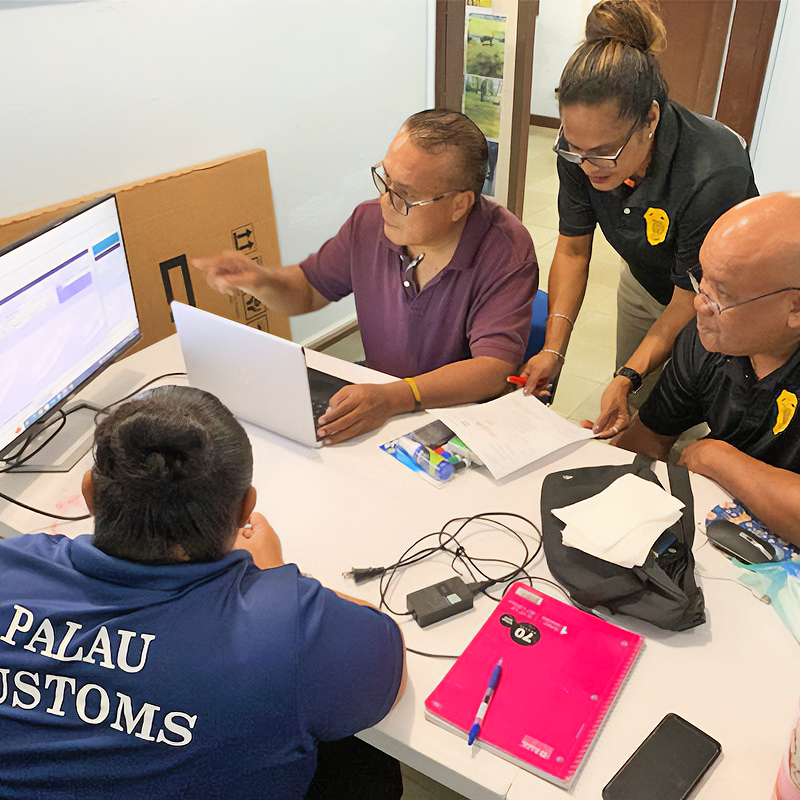
News
Extensive ASYCUDAWorld Training for Customs Officers in Palau

The Republic of Palau is committed to reforming its customs and trade procedures by rolling out ASYCUDA’s automated customs system. ASYCUDAWorld is expected to increase customs revenue and shorten clearance times. It will reduce paperwork and trade related costs while increasing transparency. To ensure a successful and sustainable shift to the new system, a well-informed and trained workforce is essential.
In light of this, customs officials from the Republic of Palau, are being provided extensive training to better understand ASYCUDAWorld ahead of the digitalization of the country’s customs operations. The training is being implemented by the United Nations Conference on Trade and Development (UNCTAD) Improving Pacific Islands Customs and Trade (IMPACT) project, funded by the European Union. It equips customs officials; traders; importers and exporters; agents; and carriers, with the skills required to efficiently use the system.
The first training took place from 20 to 30 March 2023, upskilling 31 officers from customs and 14 external stakeholders. A second training was held from 31 July to 17 August 2023 and involved 33 customs officers and 46 external stakeholders. A third training to 31 customs officers was held from 16 to 31 October 2023. All trainings were delivered by UNCTAD experts alongside the ASYCUDA National Project Team at Customs Headquarters in Koror, Palau, and consisted of two, three-hour sessions per day.
A fourth training is scheduled for December 2023 and will be open to private stakeholder entities, such as importers, exporters, agents and carriers.
The Director for the Republic of Palau Bureau of Customs and Border Protection, Mr. John Tarkong Jr. said, “At this stage, we have successfully completed the third round of trainings for customs officers. The feedback from the participants has been overwhelmingly positive. It was noticeable that after the first two sessions, our officers were well acquainted with the system and the new processes. This is a testament to the effectiveness of the training approach and the dedication of the ASYCUDA National Project Team members to adapt to the new system.”
He added, “There will be an increase towards the effective collection of customs revenues and data. Additionally, reduced processing times and increased government revenues are also projected from this customs automation, modernization and reform project. With almost half of customs administrations around the world now relying on a common automated platform to support their respective customs clearance operations, it is important to realize the impact and benefits this will have on Palau and why Palau embarked on this project.”
Ms. Ashley Adelbai, who has worked at Palau Customs for a decade, said “It was enlightening to see how technology can replace traditional customs operations and provide a lot of benefits. There will be a significant reduction in paperwork, which will not only save our time but also reduce the chance of manual errors. Additionally, the ability to view and manage documents in one centralized place will make my daily tasks easier to manage.”
The Republic of Palau is committed to reforming its customs and trade procedures by rolling out ASYCUDA’s automated customs system. ASYCUDAWorld is expected to increase customs revenue and shorten clearance times. It will reduce paperwork and trade related costs while increasing transparency. To ensure a successful and sustainable shift to the new system, a well-informed and trained workforce is essential.
In light of this, customs officials from the Republic of Palau, are being provided extensive training to better understand ASYCUDAWorld ahead of the digitalization of the country’s customs operations. The training is being implemented by the United Nations Conference on Trade and Development (UNCTAD) Improving Pacific Islands Customs and Trade (IMPACT) project, funded by the European Union. It equips customs officials; traders; importers and exporters; agents; and carriers, with the skills required to efficiently use the system.
The first training took place from 20 to 30 March 2023, upskilling 31 officers from customs and 14 external stakeholders. A second training was held from 31 July to 17 August 2023 and involved 33 customs officers and 46 external stakeholders. A third training to 31 customs officers was held from 16 to 31 October 2023. All trainings were delivered by UNCTAD experts alongside the ASYCUDA National Project Team at Customs Headquarters in Koror, Palau, and consisted of two, three-hour sessions per day.
A fourth training is scheduled for December 2023 and will be open to private stakeholder entities, such as importers, exporters, agents and carriers.
The Director for the Republic of Palau Bureau of Customs and Border Protection, Mr. John Tarkong Jr. said, “At this stage, we have successfully completed the third round of trainings for customs officers. The feedback from the participants has been overwhelmingly positive. It was noticeable that after the first two sessions, our officers were well acquainted with the system and the new processes. This is a testament to the effectiveness of the training approach and the dedication of the ASYCUDA National Project Team members to adapt to the new system.”
He added, “There will be an increase towards the effective collection of customs revenues and data. Additionally, reduced processing times and increased government revenues are also projected from this customs automation, modernization and reform project. With almost half of customs administrations around the world now relying on a common automated platform to support their respective customs clearance operations, it is important to realize the impact and benefits this will have on Palau and why Palau embarked on this project.”
Ms. Ashley Adelbai, who has worked at Palau Customs for a decade, said “It was enlightening to see how technology can replace traditional customs operations and provide a lot of benefits. There will be a significant reduction in paperwork, which will not only save our time but also reduce the chance of manual errors. Additionally, the ability to view and manage documents in one centralized place will make my daily tasks easier to manage.”




